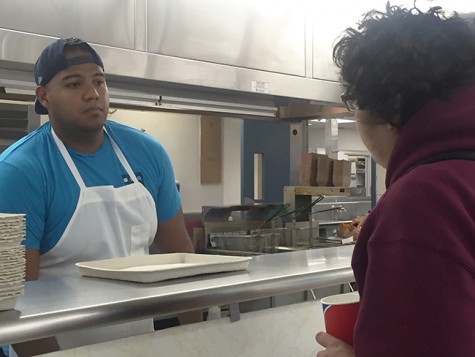
Have you ever said something to a stranger and didn’t get a response back? If your answer was “yes”, how did you react? Did it infuriate you? Did you think that person was intentionally ignoring you? Did you repeat yourself in a more firm tone, if you repeated yourself at all? Now, the million dollar question is: Did you ever stop to think that maybe they were deaf?
The subject of social awareness came up in class last week and it hit close to home for me. I grew up with my sister who is hard of hearing and around all her hard of hearing and deaf friends. You may be thinking to yourself what the difference is, if there is even a difference and if it’s even a big deal.
The difference is that some people who are hard of hearing can hear high-pitched sounds with or without hearing aids. Hearing aids can improve their sense of sound and make sounds more clear to understand. They can also talk fluently with a clear tone, whereas deaf people cannot.
People in the deaf community aren’t able to hear at all, even with a hearing aid and they do not talk with a clear tone, like people who are hard of hearing. If you’ve ever heard a deaf person talk it is a much stronger, louder, muffled sound because they cannot control the tone of their voice.
To answer the last question, yes, it is in fact a big deal. If there is anything I learned about people in the deaf community it is this: Do NOT treat them like their incapable of doing for themselves, do NOT refer to them as hearing impaired, and DO refer to them as deaf people or deafies.
I decided to interview one of our very own staff members/students, Kerry Knighton, about his experience working in a hearing community as a deaf person.
”Yeah, like for example you want a burger, right? I ask you oh do you want everything on it? They say yes, I look down, put everything on it. When I look back up they say ‘Oh I said I didn’t want that. You didn’t hear me?’ It just becomes frustration” says Kerry Knighton. “It happens all the time.” He says that people usually feel really bad when he tells them that he can’t hear because he is deaf and they apologize.
I ask if there are any rude customers. “Some. Not many. If they’re in a rush, they will be rude.” He then starts telling me about his co-worker who has a much more difficult time working in the cafeteria than he does because he is completely deaf. “Some of the co-workers are not so open about deaf people. They will yell at him and tell him what to do. This one co-worker forced him to call out numbers on the ticket and I thought that was wrong. If she would’ve gave it to me, it would’ve been okay. He was really frustrated. So I told him don’t worry about it, I’ll take care of that situation.”
He tells me that he doesn’t expect everyone to know sign-language, but at least respect and understand that he can’t hear or talk.
He says that he considers himself as being deaf, but to hearing people he likes to be referred to as hard-of-hearing because if he were to tell them he’s deaf they would expect for him not to be able to speak. “When I say I’m hard of hearing, they know I can speak.”
I asked Kerry what he would want people to know about deaf people. He stressed that being called “hearing impaired” is an insult. “It’s just like calling a black person a Negro or calling gay people, ‘fags’. It’s an insult.”
“For example, when I go to the movie theatre to watch a movie and the caption says ‘Closed Caption for the hearing impaired’. I see that a lot and it’s a big insult. But you can’t blame people for not knowing. ”
He understands, as do others in the deaf community, that hearing people refer to them as “hearing impaired” in attempt to be more sensitive or politically correct but in reality they are being insensitive and are ignorant to the truth about the deaf community.
I ask Kerry if there was anything else he would like for the hearing community to know. “I would like to add that I’m not trying to put people to shame. I just wanted to be heard and educate those who don’t know much about being deaf. It’s not just a disability, it’s a culture. That’s how we’re different from others and yet we all can always find a way to communicate without getting misjudged or discriminated out there.”


